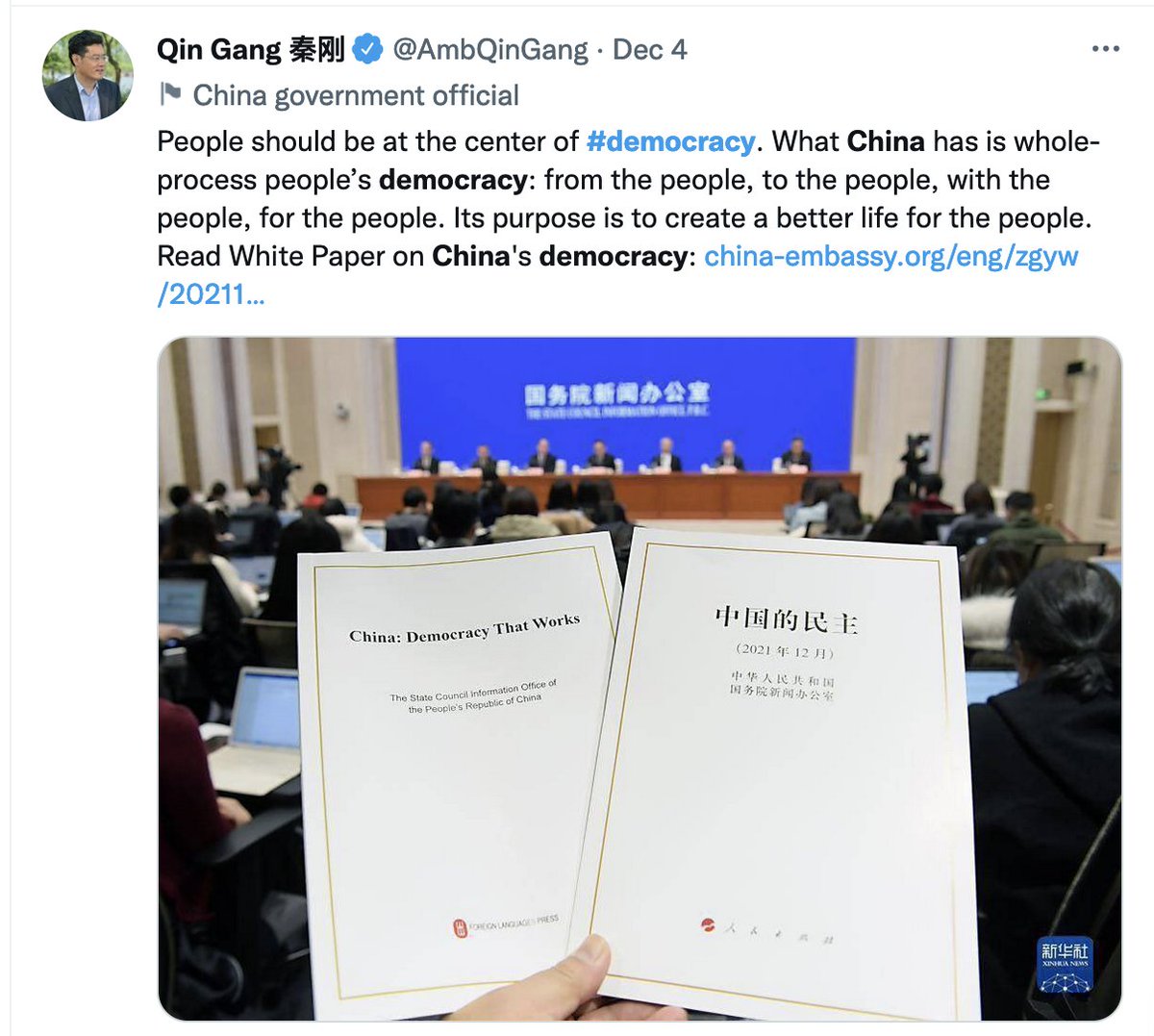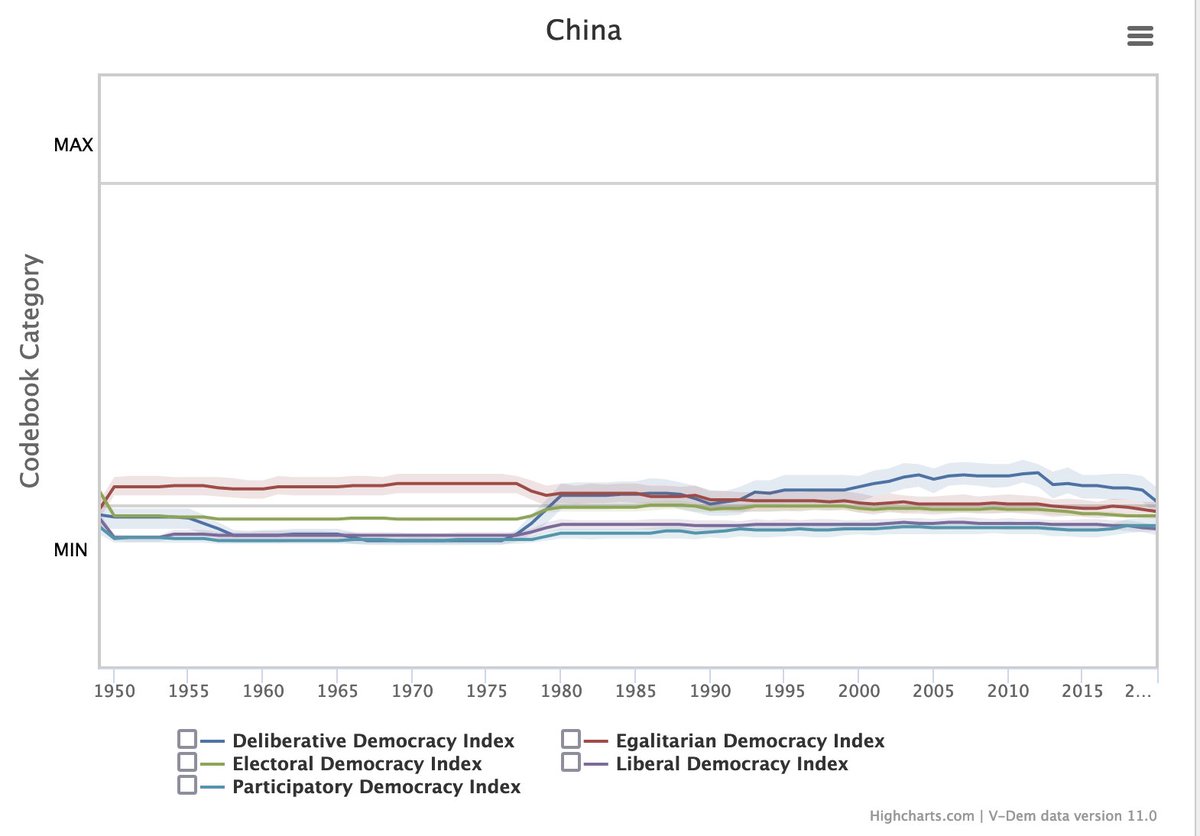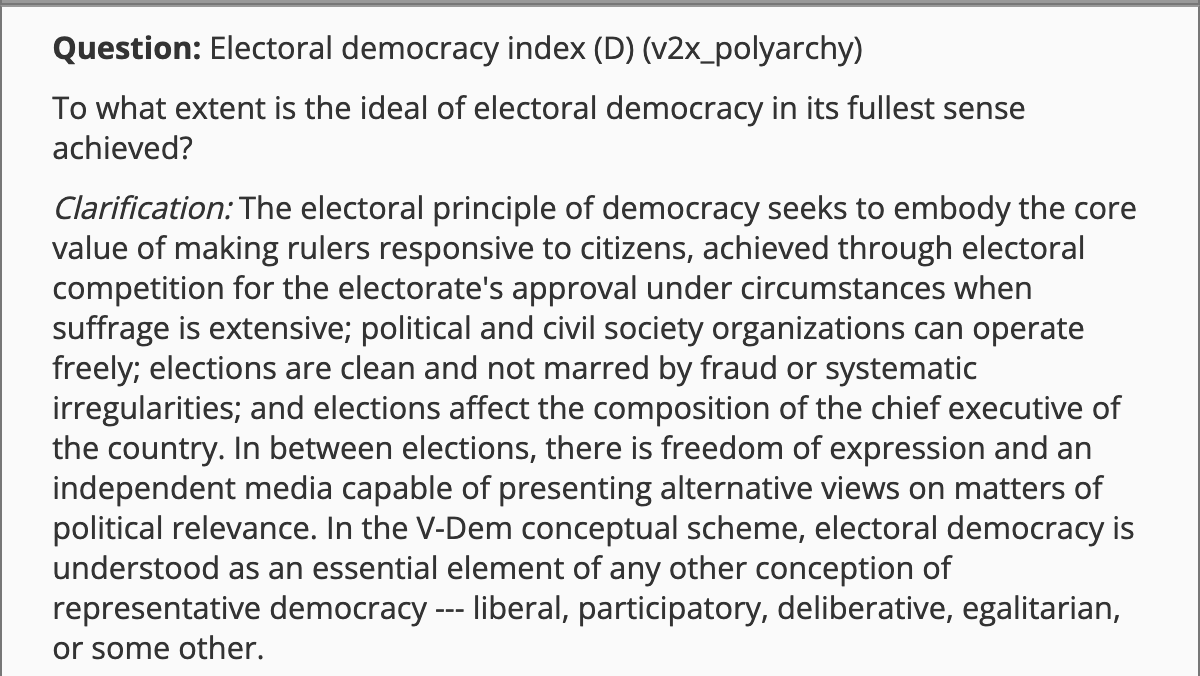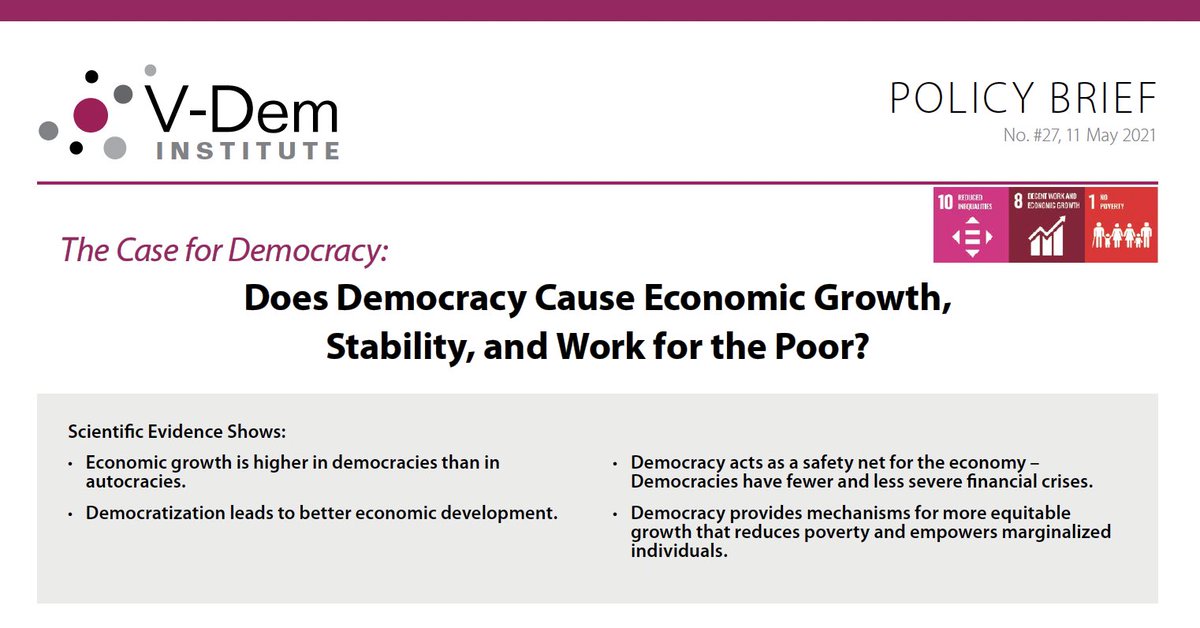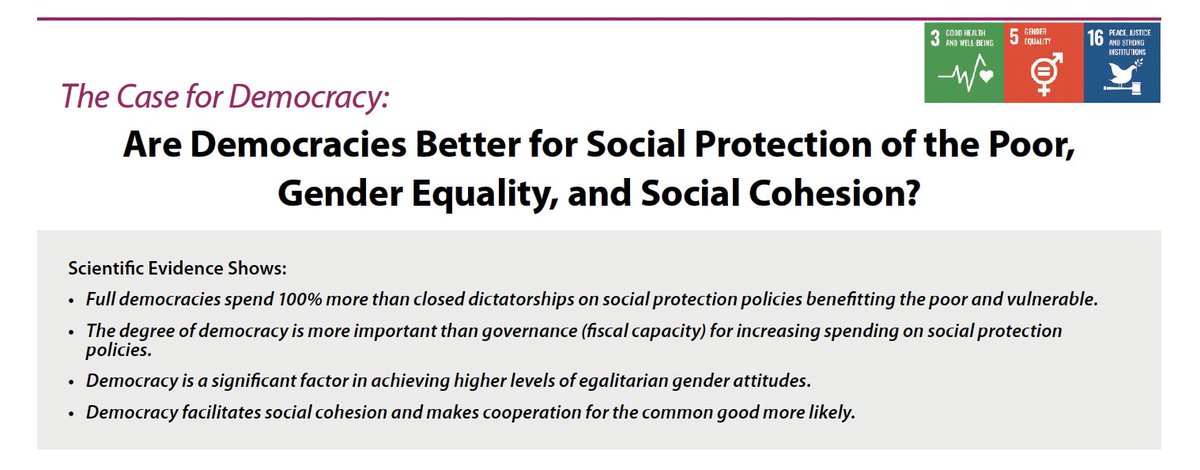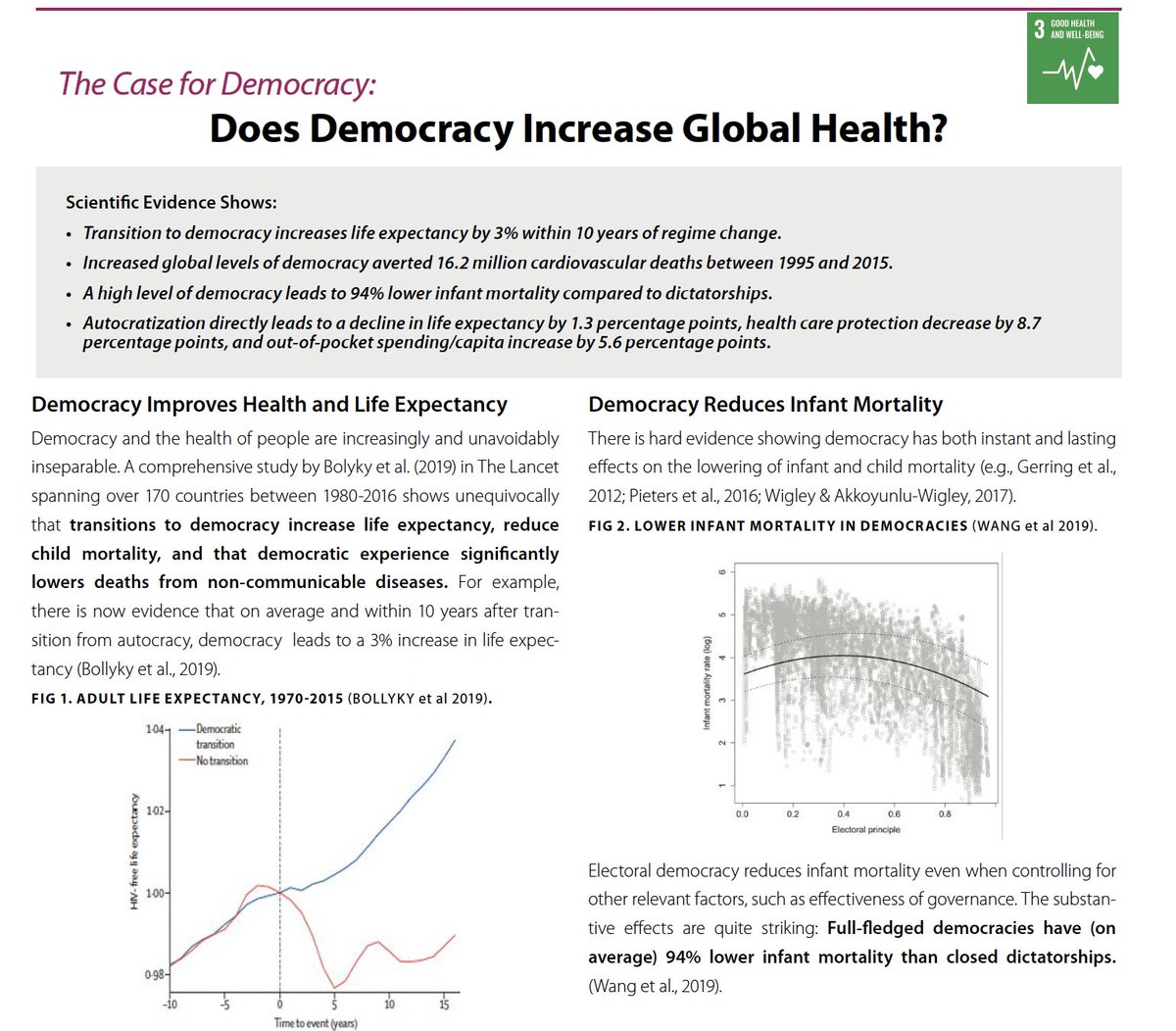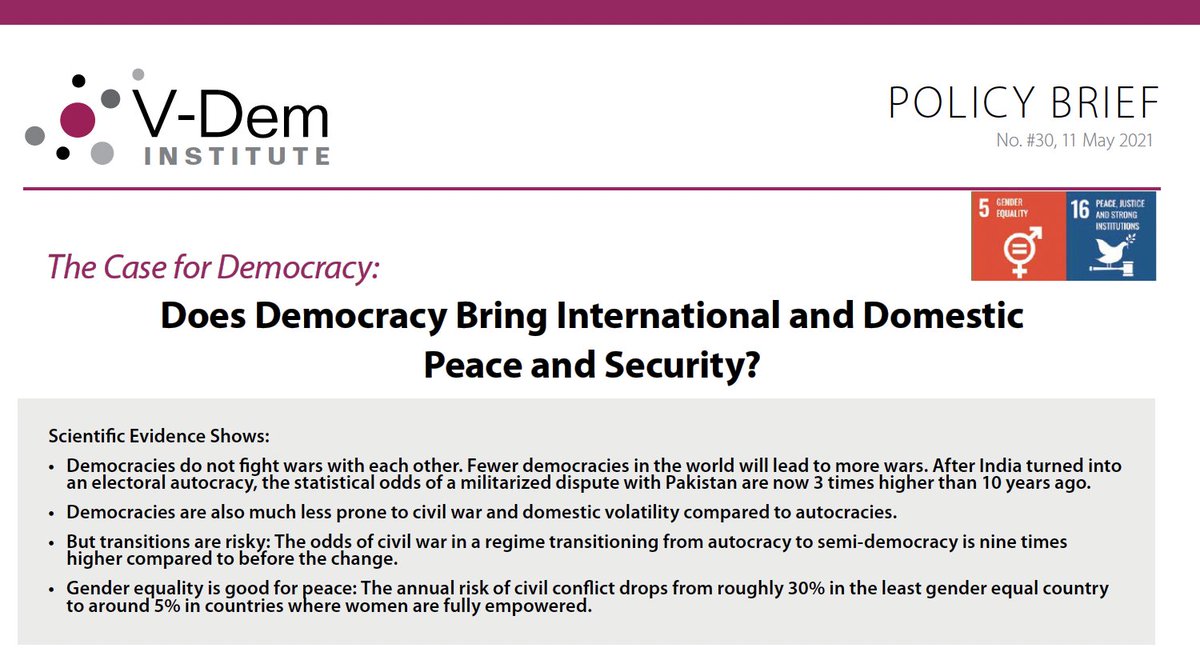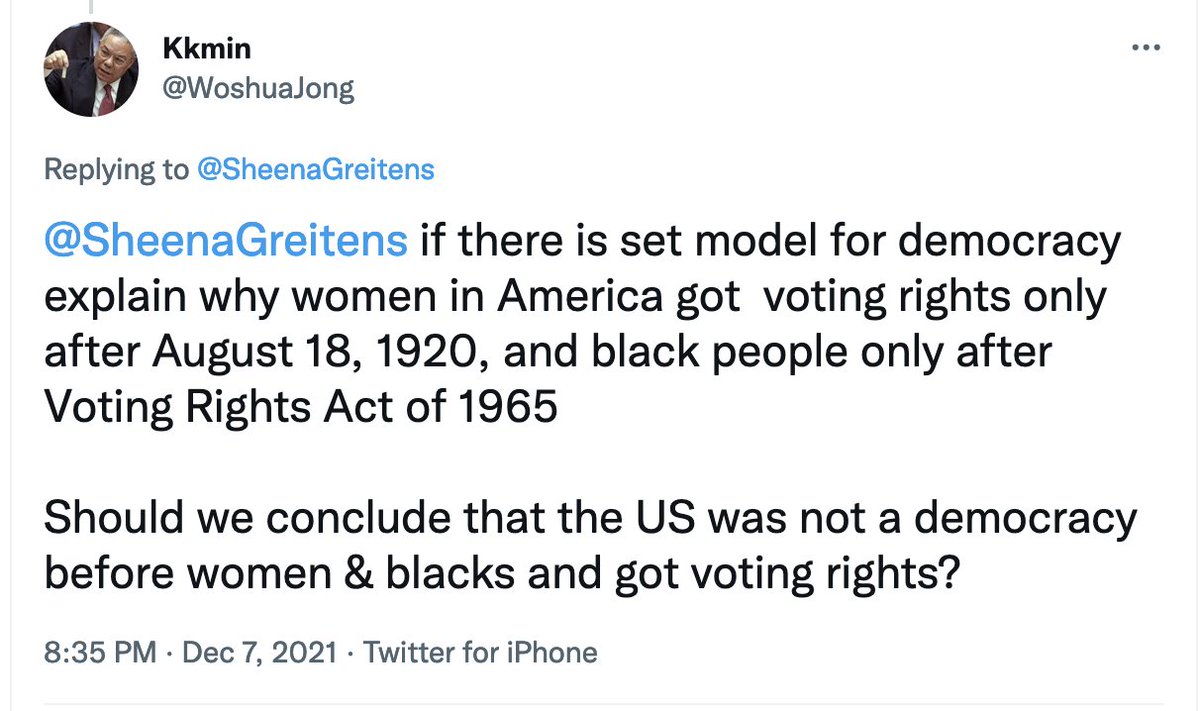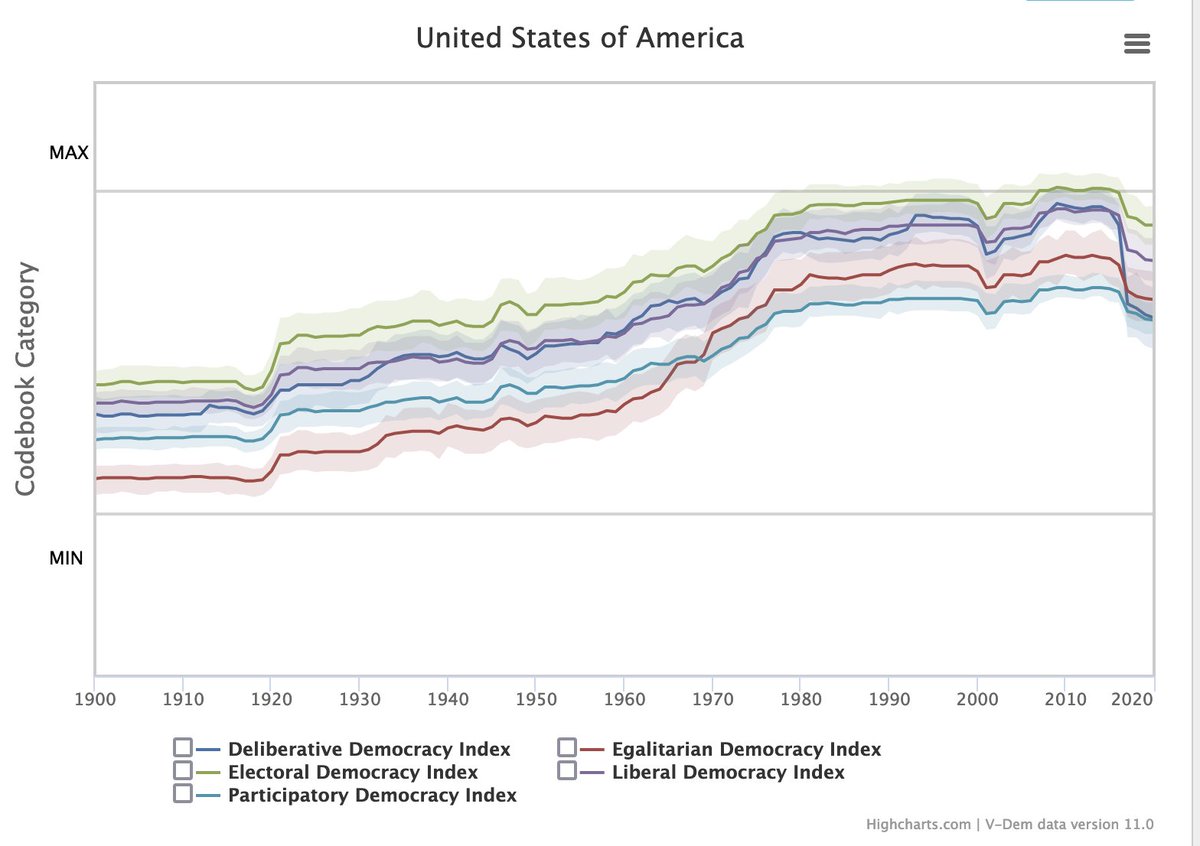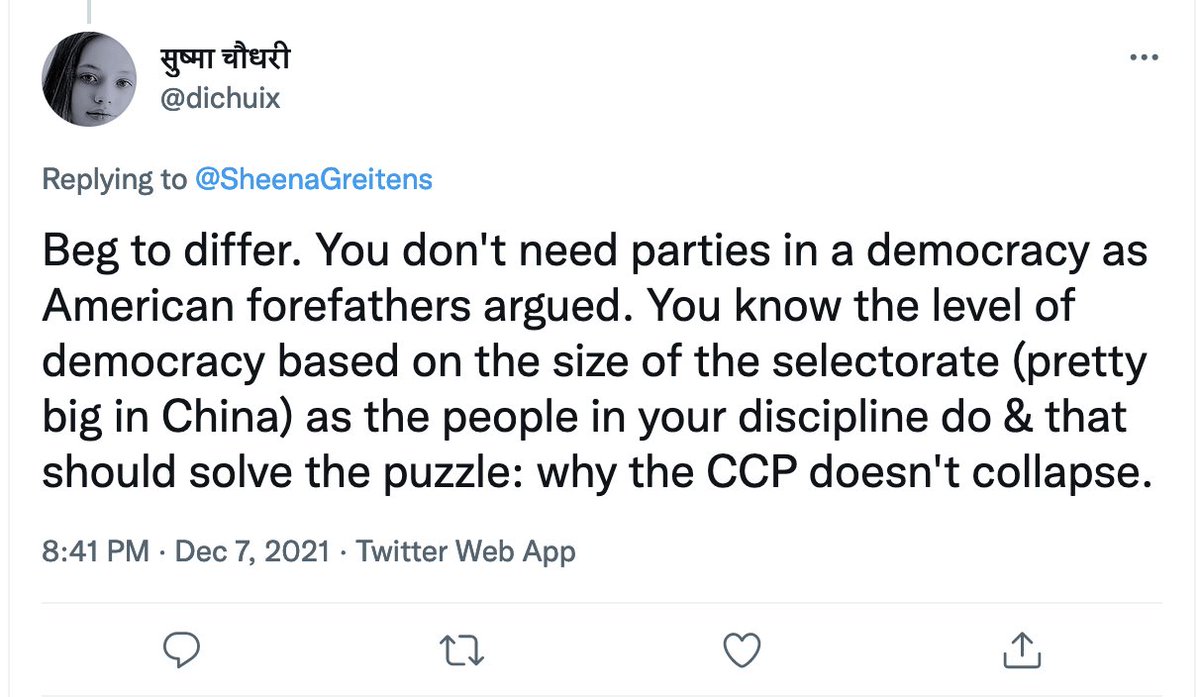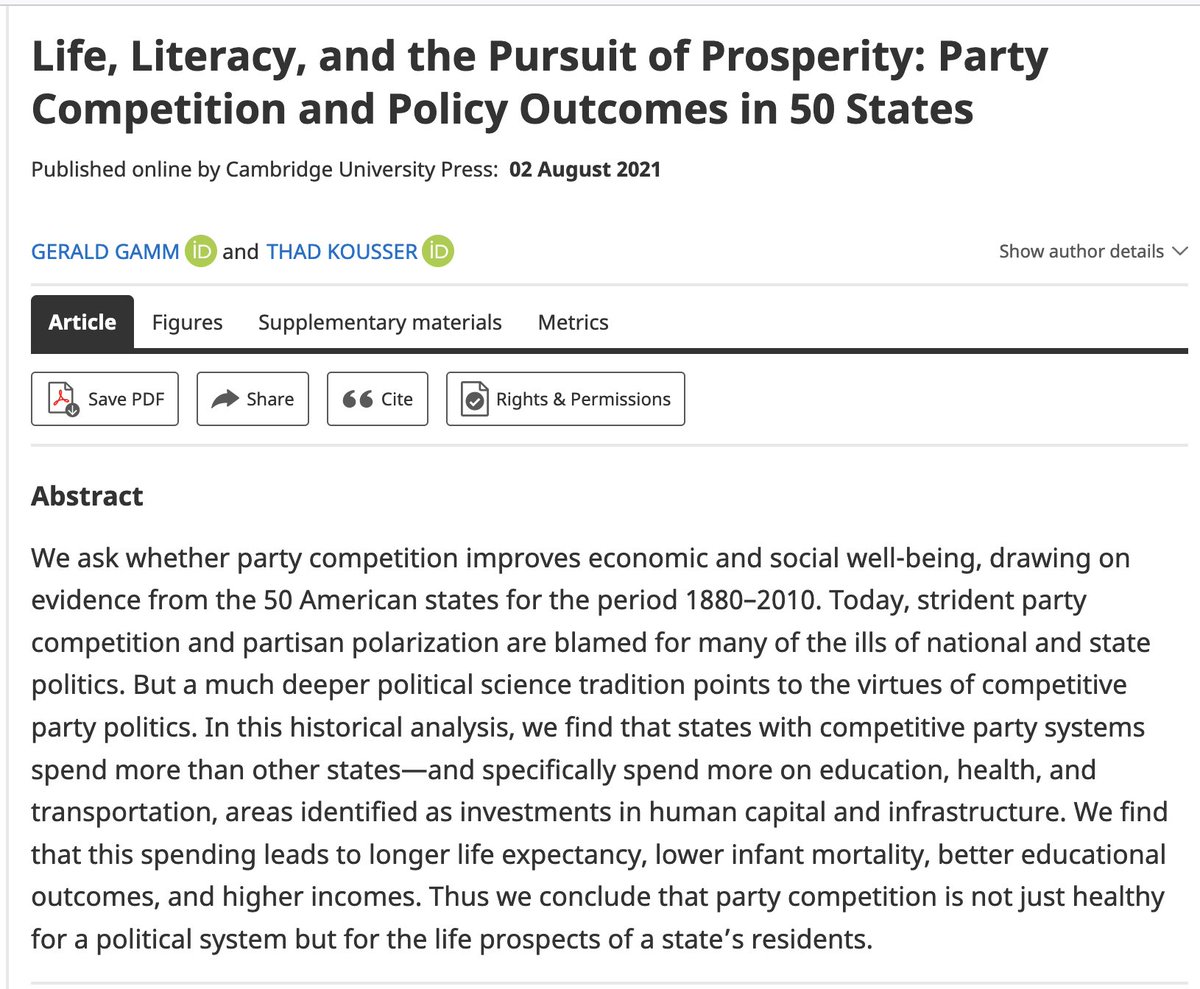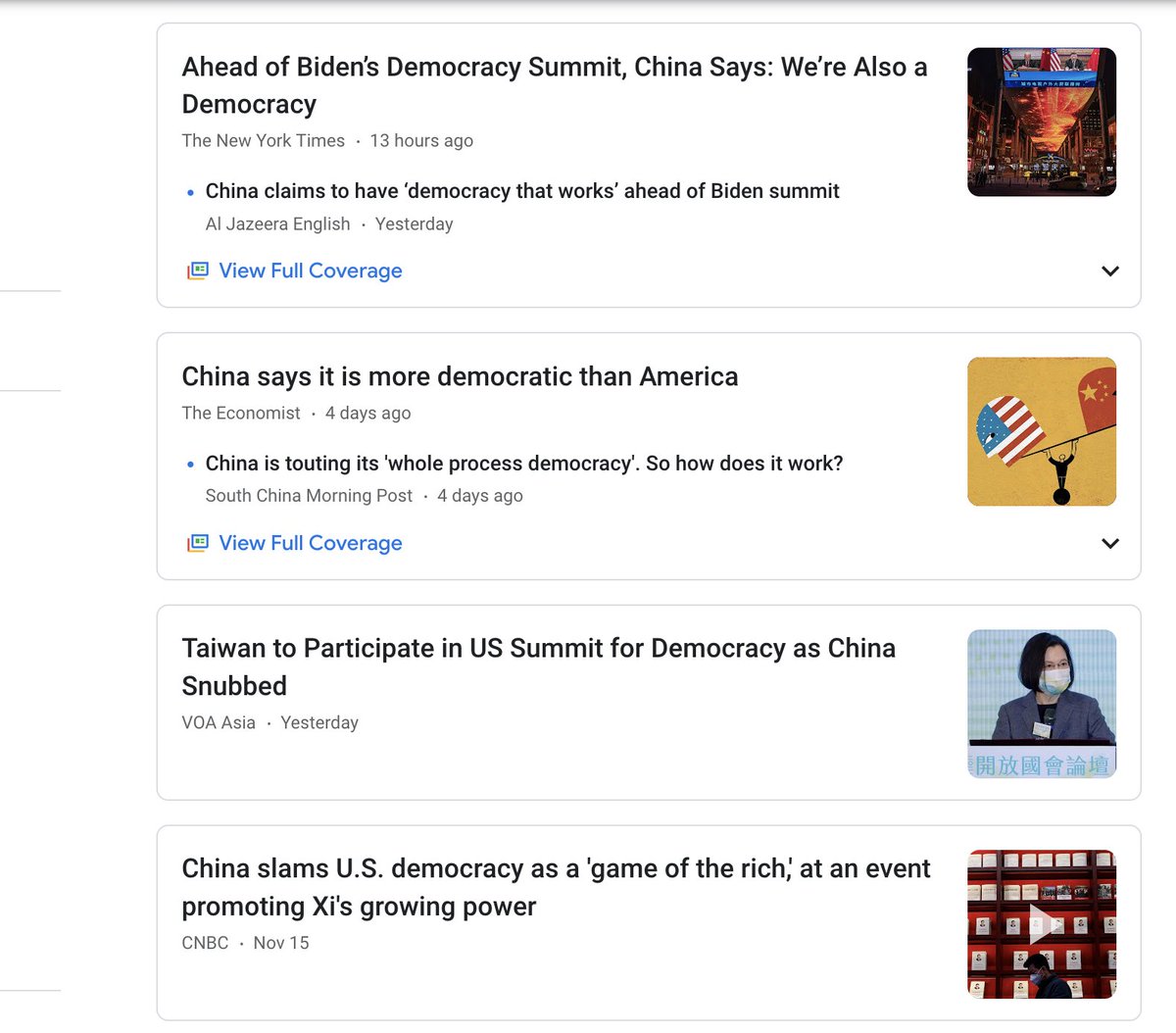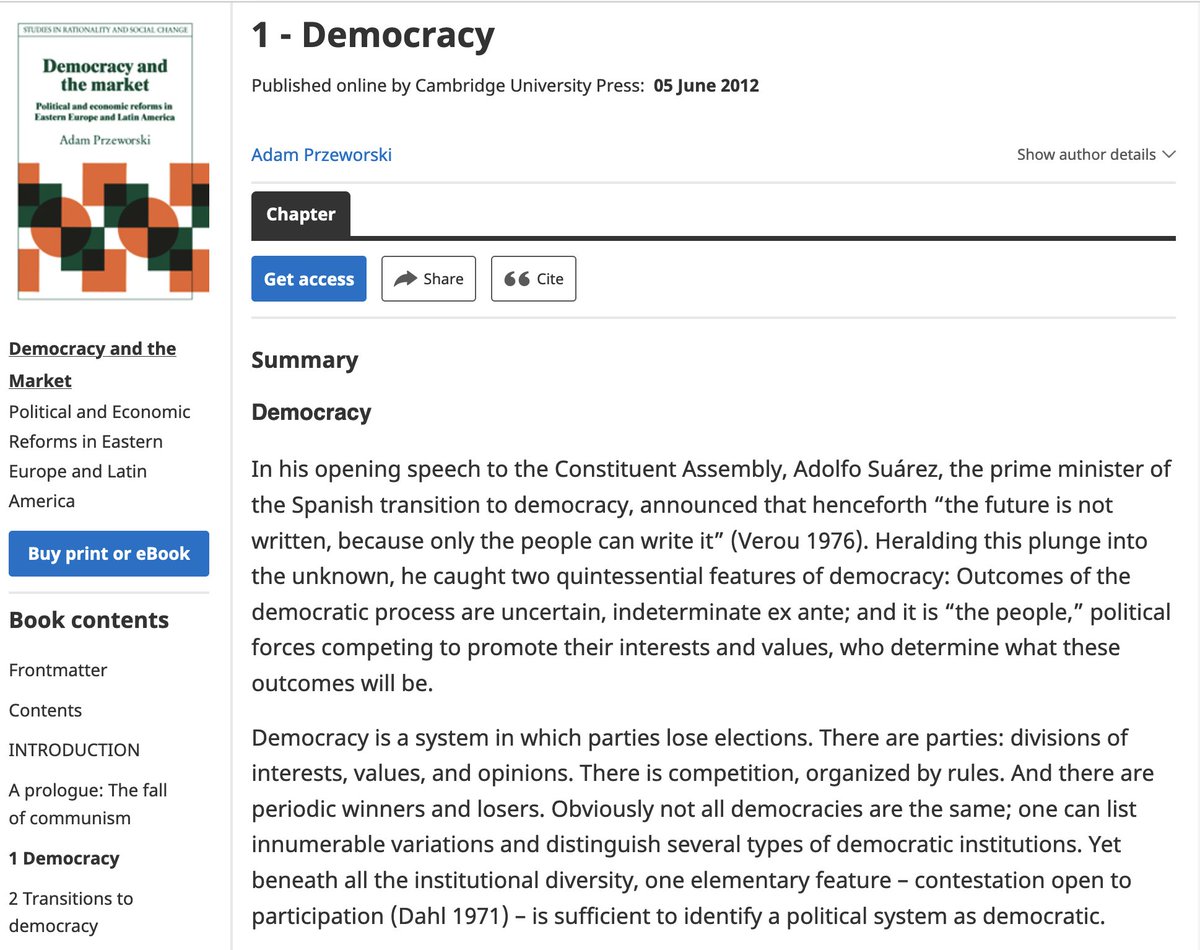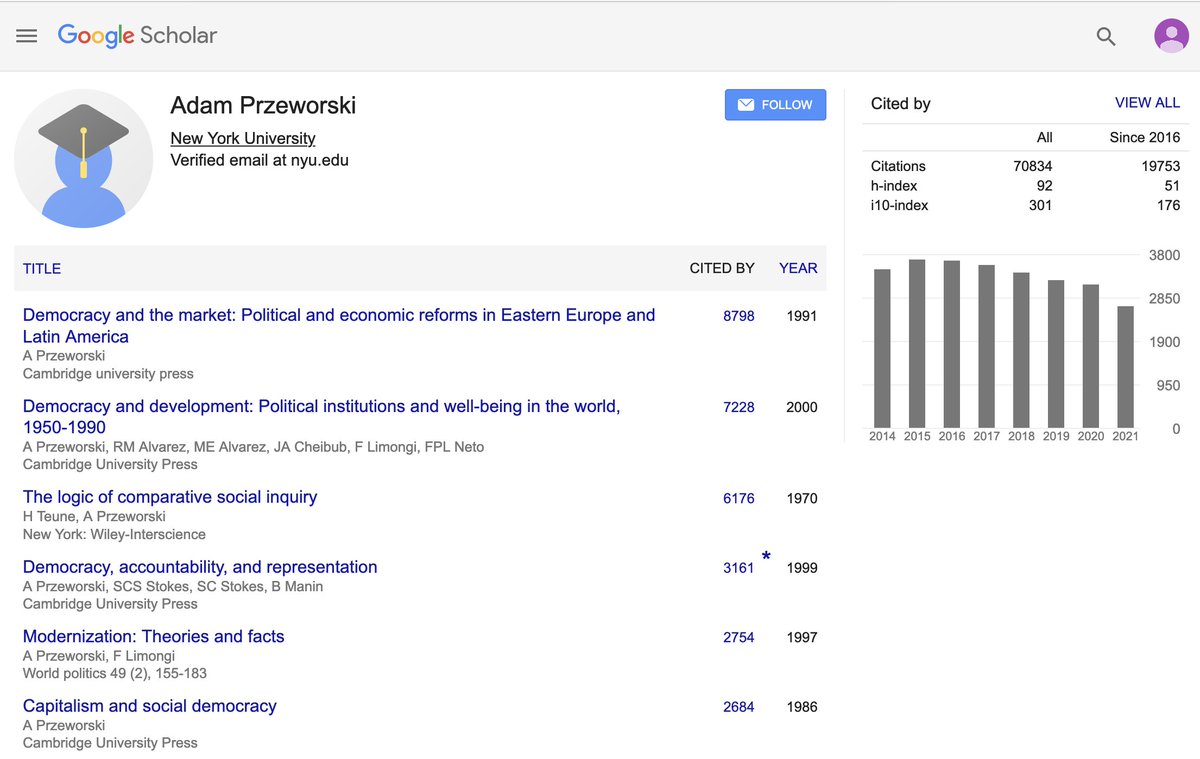Reminder: the most basic definition of democracy is "a system in which parties lose elections."
(You have to actually alternate parties in power to be sure that one party won& #39;t balk & try to hold onto power at the point of a gun.) 1/2
(You have to actually alternate parties in power to be sure that one party won& #39;t balk & try to hold onto power at the point of a gun.) 1/2
The legislature has to be popularly elected. The chief exec has to either be popularly elected or elected by legislature that was (parliamentary democracy). There has to be more than one party, & they have to alternate in power. That& #39;s the basics (Przeworski et al definition).
Places like @vdeminstitute now disaggregate into different components of democracy: deliberative, egalitarian, electoral, liberal, & participatory. Just for the record, here& #39;s China on all of them:
Even in these more complex indices, however, note that electoral democracy is "an essential element of any other conception of representative democracy."
Why does this matter? Because as a new series of @vdeminstitute papers point out, democracy delivers better governance - on growth, on gender equality, on health, & more. Here& #39;s the topline summary on economic outcomes:
Here& #39;s the one on social protections & gender equality:
On health outcomes, democracies outperform autocracies in terms of infant mortality, life expectancy, etc:
They also perform comparably well on domestic peace & security (fun fact: perhaps because of that gender equality stuff!):
So the point here is that the one phrase @AmbQinGang omitted - government *by* the people - is essential to democracy. And democracy, *defined this way*, produces better results *for* the people, too.
Fun fact: as @FareedZakaria pointed out, Europe became liberal before it became democratic. (Constraints on the executive - the Magna Carta was in 1215 IIRC? - preceded expansion of the franchise.) But... China is neither (see above chart). https://twitter.com/WoshuaJong/status/1468405501331271683?s=20">https://twitter.com/WoshuaJon...
One of my favorite class activities has students list attributes required for democracy & then ask "what year did the US become a democracy"? Point being exactly the ? below. FWIW, here& #39;s the V-Dem answer: the US was not fully democratic when women & minorities couldn& #39;t vote.
Actually, every year we ask students to assess the classic argument that "Modern democracy is unthinkable save in terms of parties.” Evidence suggests party competition still matters for American democracy & its outcomes. For ex, this just came out in our flagship journal:
So this is an important but tricky point: why use a minimalist conception of democracy? Because if we want to know whether democracy improves other outcomes, those outcomes can& #39;t be part of the definition in the first place. (It& #39;s weird, I know.) https://twitter.com/AmPowerBlog/status/1468404366759522308?s=20">https://twitter.com/AmPowerBl...
Example: say we want to know if democracy affects economic inequality. If we define democracy as an economically equal system, then we can& #39;t see whether it affects equality, because it& #39;s already in the definition. That& #39;s why we use the simplest possible definitions.
Finally, for whatever it& #39;s worth, I posted this on November 6, 2020, applying this same framework to the US presidential election: https://twitter.com/SheenaGreitens/status/1324721812706598912?s=20">https://twitter.com/SheenaGre...
. @NickRomanow is right here that ppl aren& #39;t downloading the White Paper. But they do skim media headlines. Here& #39;s a snapshot of the coverage the White Paper& #39;s getting:
For the record, @vdeminstitute is based in Sweden, & the team is multinational: https://twitter.com/bikendawadi/status/1468442971091701762">https://twitter.com/bikendawa...
1. This misses the part about democracy producing better outcomes for people.
2. Is that what counts? Let’s ask the Chinese ppl. We could, you know, offer an alternative & see how many citizens would take it. https://twitter.com/honglilai/status/1468449763809021956">https://twitter.com/honglilai...
2. Is that what counts? Let’s ask the Chinese ppl. We could, you know, offer an alternative & see how many citizens would take it. https://twitter.com/honglilai/status/1468449763809021956">https://twitter.com/honglilai...
OK, one addition today. Ppl asking about Japan. Fair Q: there *is* debate over the alternation rule. If you require it, you risk classifying a few dems (Japan) as non-democracies. But if you don& #39;t, you risk classifying autocracies as democracies. Risk of error either way.
FWIW, this def& #39;n allows us to ask ?s like: can you have accountability w/o democracy? Lily Tsai (on China specifically) says yes, under certain conditions. BUT only local; doesn& #39;t scale to the national level. See: https://doi.org/10.1017/CBO9780511800115">https://doi.org/10.1017/C...
Thanks for highlighting this additional info on VDem coders, most of whom are from the places they are coding: https://twitter.com/nc801d2/status/1468639869278855172">https://twitter.com/nc801d2/s...
Adding this interesting counterpoint from @ElvinOngPolSci. (If we are discussing Summit for Democracy, I also have issues w/the idea. But I’ve laid them out elsewhere.) https://twitter.com/tompepinsky/status/1468603904992718856">https://twitter.com/tompepins...
Better link to Dr Ong’s thread: https://twitter.com/elvinongpolsci/status/1468601087204724740">https://twitter.com/elvinongp...
Y& #39;all, the quote at top of this thread is from Democracy and the Market, by Adam Przeworski. The guy grew up in Poland. He knows a thing or two about socialism.
Just to keep this whole discussion organized, here& #39;s the reply to the (many) people raising the Greek origins of the term & "rule by the people": https://twitter.com/SheenaGreitens/status/1469007031747158020?s=20">https://twitter.com/SheenaGre...

 Read on Twitter
Read on Twitter